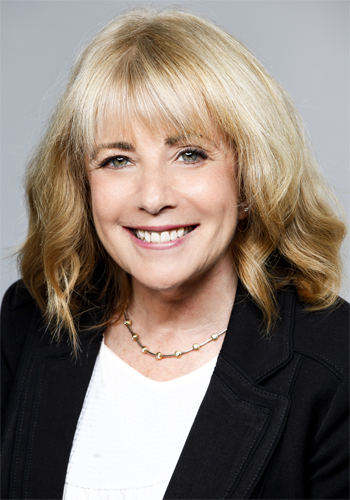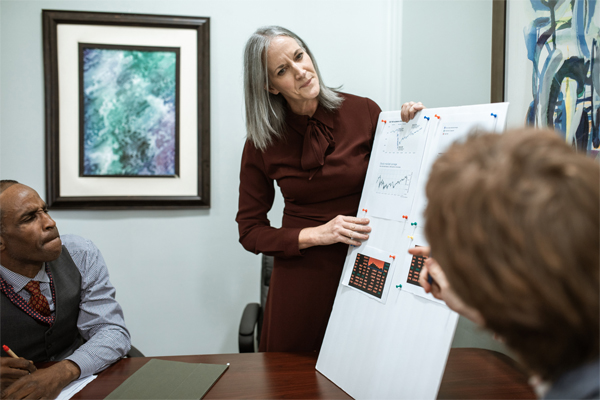More than 80% of women worldwide have faced gendered ageism, but diversity, equity and inclusion (DEI) efforts aren’t addressing it, according to a new report carried out by coach, author and podcast host Badass Women at Any Age, Bonnie Marcus.
Gendered ageism and bias has serious implications for women and their companies, as it is pushing valuable assets with great experience, expertise and wisdom out the door. Marcus provides timely advice and tips on what employers can do to support and retain 50+ women in the workplace, who will ultimately help to take their business to the next level.
Women still encounter many challenges in the workplace today. Progress towards gender equity has been slow and now virtually stalled by the pandemic. They are still not paid equally to their male counterparts. They lack sponsorship as well as the same opportunities for advancement offered to men. It remains an unlevel playing field.
To address this inequity, many companies include gender bias in their DEI initiatives and recognise the importance of advancing more women to leadership. As professional women in the workplace, we recognise the challenges of gender bias; yet may not be prepared for gendered ageism which affects us at every stage of our career.
AGE & GENDER INTERSECTIONALITY
Gendered ageism is the intersectionality of gender bias and ageism. This is a growing concern for professional women over 50 who are affected by ageism earlier than men by what Catalyst calls ‘lookism’. Due to society’s emphasis on youth and beauty, older women are viewed not only as less attractive, but less competent and less valuable, as they show visible signs of ageing. As a result of this, women are marginalised and often pushed out the door prematurely.
To gain more insight into how gendered ageism affects women in the workplace, I surveyed 729 women from the age of 18 through 70 about their experiences in the workplace. Most of the respondents (65%) live and work in the US, the balance from Canada, the UK, Europe, and the rest of the world.
The key findings from the survey highlight not only the pervasiveness of gendered ageism, but also demonstrate clearly how this affects women’s career trajectory and financial security.

GENDERED AGEISM FINDINGS
Here are the key findings from the research:
1. Gendered Ageism is a reality for women.
Around 80% of those surveyed experienced some form of gendered ageism. A third of all respondents (33%) felt they could not get a job or interview because of their age. The most common experiences were “feeling opinions were ignored” (47%), “seeing younger colleagues get attention” (42%) and “not being invited to key meetings” (35%).
2. You’re too young or too old.
Women reported feeling that they are either too young or too old. 77% of those under 35 reported the negative impact of gendered ageism. Starting at age 35, women begin to experience gendered ageism at increasing rates as they age with 60% of those 35-40 reporting the experience. The percentage peaks among those between 59 and 64 with 88% stating they had experienced some form of gendered ageism.
3. Gendered ageism is everywhere.
For those currently working, 77% reported a prevalence of gendered ageism with 41% stating it was “very or moderately” prevalent. Those at public companies were more likely to report a prevalence with 82% compared to 73% at private corporations.
4. Lack of resources and support.
A full three-fourths (75%) of those who experienced gendered ageism and were still employed did not take any action. Of those who did not act, 70% stated they didn’t take action because they didn’t believe it would make a difference. More than a quarter (26%) didn’t trust HR and 23% did not want to risk their job. Of those that did act, there was little satisfaction. Of the 19% that spoke to their manager 44% were very dissatisfied and 17% were somewhat dissatisfied. The satisfaction rates for the 11% that spoke to HR were even lower with 71% either very or somewhat dissatisfied.
5. DEI doesn’t address gendered ageism.
Around 77% responded that it was not included in their company’s DEI initiatives. Interestingly, 23% stated they did not know and 15% said their company did not have DEI initiatives. Public companies were more likely to have DEI, all but 3%, but only 23% of both public and private companies included gendered ageism. Almost a full third of private companies did not have DEI at all (30%). However, almost all respondents from both public and private companies (93% and 83% respectively) believed that more could be done to combat this prejudice.
6. Gendered ageism has long term implications for retirement.
More than half of those surveyed reported that they do not have enough money to retire and nearly all (95%) of those over 53 – including those 65-70 – stated that they want or need to keep working. Yet, more than a quarter 28% of women 59-65 thought their chances of continuing to work were “fair” or “poor”. The most common reason stated – “My company does not value older workers”.
7. Once fired, it’s difficult to get re-hired.
Of those who were unemployed, 9 out of 10 stated they were fired, laid-off, forced to retire or had trouble getting a job or interview because of their age. More than half (54%) had been unemployed for more than a year. Additionally, 75% of these respondents do not have enough money to retire – creating greater urgency.
ADVANCING SKILLS & CAREER MATTERS
What can women do to stay marketable, keep their jobs, and advance their careers?
- Be proactive and vigilant about positioning yourself as a valued contributor. Make sure you understand your value proposition; how your work contributes to positive business outcomes. Use that value proposition to advocate for yourself and build visibility and credibility across the organisation.
- Build a supportive network of allies and champions who will speak up for you when you’re not in the room. Reach out to colleagues across generations for strong relationships that enable you both to learn from each other.
- Declare your ambition. Let your manager know that you’re committed to your job and your company and invested in doing your best work. Have a discussion and get their input about the future and lay out a plan for the next few years of how you can continue to add value to the organisation.
- Keep your skills up to date. Be proactive and stay ahead of the curve by identifying new trends in your industry and take advantage of training offered by your company or by outside resources.
- Recognise how your own negative beliefs and assumptions may sabotage your best efforts to move your career forward. What is the story you tell yourself about yourself? Do you tell yourself you’re too old to get promoted? To learn new things? If your story doesn’t support your ambition, write a new empowering story that embraces your talent, your experience, your wisdom and everything you bring to the table because of your age.

SUPPORTING 50+ WOMEN AT WORK
What can companies do to retain and support women over 50? Companies must first acknowledge the underlying bias that continues to push women over 50 out of their workforce. Retaining qualified and talented workers is more important than ever to fill the void from the Great Resignation and to provide role models for younger women. The bias needs to be addressed at every level of the organisation starting with senior leadership.
Here’s what actions women want their companies to take:
- 61% want gendered ageism to be recognised as a DEI issue.
- 54% want the company to acknowledge the accomplishments of older women.
- 49% would like their company to facilitate cross-generational networking.
- 49% would like gendered ageism to be included in mandated unconscious bias training.
- 48.4% would like their company to assess the policies and workplace practices around hiring, compensation and promotion.
- 47% want their company to create a safe environment for them to discuss their experiences with gendered ageism.
The reality is that gendered ageism is a challenge for women at any age. It’s also a challenge for companies who need to plug the leaky pipeline and retain their top female talent. Companies must recognise their bias is pushing valuable assets out the door who have great experience, expertise, and wisdom to take them to the next level.
MORE ABOUT BONNIE MARCUS

Bonnie Marcus M.Ed, CEC, is a certified coach, speaker, host of the podcast Badass Women at Any Age, and author of The Politics of Promotion: How High Achieving Women Get Ahead and Stay Ahead (Wiley). Her latest book is Not Done Yet! How Women Over 50 Regain Their Confidence and Claim Their Workplace Power.
MORE RESEARCH ON WORK-RELATED AGEISM
Research from the Centre for Ageing Better recently reported on the shocking levels of inequality and discrimination suffered by staff aged over 50, especially those from Black, Asian and Minority Ethnic backgrounds. Click here to read more.
The International Longevity Centre UK has highlighted the economic opportunities of investing in older workers. Click here to read more.





































